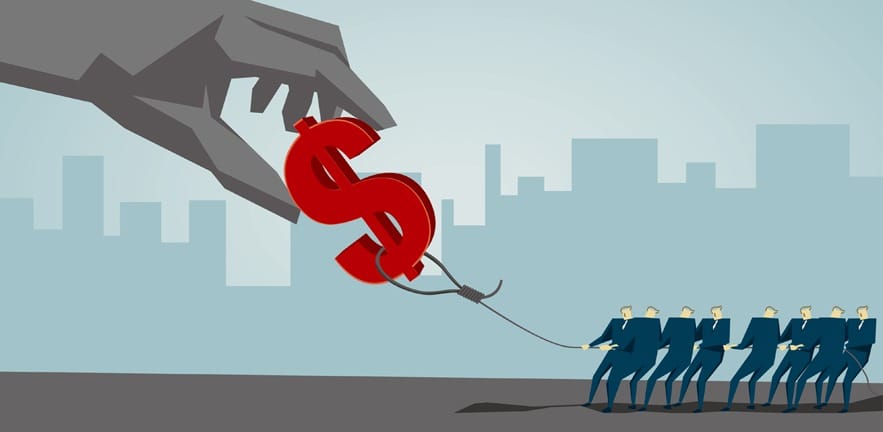In banking, trust and benevolence don’t mix, finds new research from David De Cremer of Cambridge Judge Business School.

by David De Cremer, KPMG Professor of Management Studies, Cambridge Judge Business School

We’ve all heard the famous lines about money, from the Beatlesque to the Biblical: that it “can’t buy me love,” it “makes the world go around,” and that the love of it is “the root of all evil.”
Spurred by the controversy surrounding bankers and their role in the financial crisis, academics like me have spent much of the past decade looking at workplace behavioural issues involving banking and ethics – to dig deeper into the widespread criticism, right or wrong, that bankers didn’t act in ways that contributed positively to the welfare of society.
While it remains a topic of debate whether some bankers are by nature disposed to less trustworthy behaviour or whether the self-centred and competitive culture of banking drives them to behave less responsibly toward wider society, research recently completed by a team I led in the Netherlands and Hong Kong sheds new light on the issue by looking at the practice of banking through the concept of money: we found that the mere thought of money among people entrusted to handle the stuff causes them to behave in an unfair and even cheating manner.
Based on a study of 274 adults, we found that giving trust to people with money on their minds will not lead them to take care of your interest, because money undermines benevolence. So while giving trust to people in most circumstances invites them to reciprocate kindly, we concluded that the corrupting thought of money means this would be a waste of effort when it entails giving trust to a banker.
In our study, using a two-party game, Party 1 participants each receive an endowment of $1, and they need to decide how much (if any) of that to send to Party 2. As for Party 2 participants, they received from the experimenter $3 for each Party 1 participant, and were told that this sum represented a tripling of what their Party 1 counterpart had transferred to them. Party 2 then needed to decide how much of this $3 to return to Party 1.
This is known in research as a “trust game.” If Party 2 acts fairly under what is known as the “equality rule” in psychology and behavioural economics, Party 2 will return to Party 1 at least somewhat more than what Party 1 transferred to them – thus making everyone better off through a pie enlarged by the experimenter’s tripling move. In other words, if party 1 gives trust to party 2, the pie is enlarged and both parties can be better off than when party 1 would not give trust.
The research delved deeper by telling half the Party 2 participants that their Party 1 counterparts started with $1 and transferred it all, which represents a clear and full sign of trust. The other half of Party 2 was told that their Party 1 counterparts had an endowment of between 50 cents and $1.50, making the $3 they received more ambiguous in terms of whether Party 1 trusted them completely or not.
Before Party 2 participants made the decision of how much of the $3 to transfer back to Party 1, the crucial factor in the experiment was introduced: half of Party 2 participants were primed to think about money – specifically, they were shown a $1 bill and asked to describe five characteristics of it, while the other half were put in a control condition by being asked to think about a wooden chair. (Both groups chose things like appearance, texture and smell.)
As would be expected in a world where people reciprocate kind behaviour, Party 2 participants in the control condition reciprocated much more when it was clear that Party 1 gave all their money to them than when it was unclear how much Party 1 initially possessed. They gave back on average $1.05 when they knew that Party 1 gave everything and only 77 cents when it was uncertain how much of Party 1’s endowment they received. In other words, when Party 2 people recognised the trust signal, giving trust promotes the interest of both parties and maximises joint outcomes.
The striking result was found, however, in the condition where Party 2 participants were primed to think about money; in this situation, it made very little difference whether or not they knew how much Party 1 initially possessed – returning 79 cents when they knew Party 1 started with $1, and 83 cents when they didn’t know how much Party 1 started with. This showed that when thinking about money, participants became insensitive to signals of trust (whether such signals were clear or not) and damaged the interest of Party 1.
As depressing as our findings may sound, they suggest that people working with money (we assume those who work with money are thinking about it) are not susceptible to the trust they receive from others, and that it doesn’t matter whether they are trusted completely by others to motivate them to maximise joint value and thus to contribute ultimately to the welfare of larger society.
What causes this? We plan further research on this and other questions (including the difference between thinking about crisp new currency and older banknotes), but what we’ve found so far suggests that money increases one’s sense of independence and therefore decreases their mental receptiveness to the social signal of trust.
So if you wonder whether it would pay off to give trust to your banker, be careful not to expect too much in return – because this trust won’t buy much love and won’t make the world go round in a jointly beneficial way.
David De Cremer, KMPG Professor of Management Studies at Cambridge Judge Business School, conducted this as-yet unpublished research – entitled Feeling trusted in an investment game: The undermining effects of money reminders – with two colleagues in the Netherlands and one in Hong Kong.

